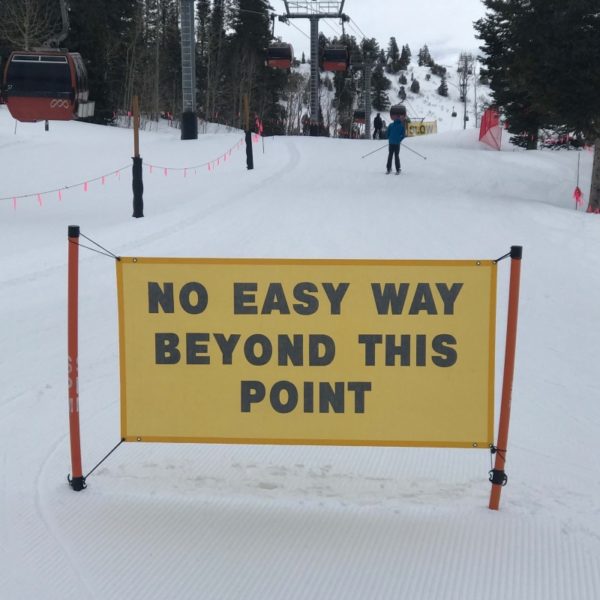In January, I was in Utah, skiing with my wife Debbie, when we came across the sign below. It got me thinking about the journey we’re all on as business owners.

There comes a time in your business where things get challenging. As the sign says, there’s no easy way beyond this point. Seth Godin summed it up perfectly in his book The Dip.
What do most firms do when things get difficult? According to Seth, they diversify, thinking that moving into a new market or starting a new business makes sense and will alleviate the really difficult stuff they’re butting up against in their current business.
But it’s a mistake.
It’s what he describes as The Dip. It’s the phase that every business or person goes through when learning a new skill.
Initially, we get some quick wins. However, if you want to keep growing and pushing forward, at some point on the journey, things get challenging.
I think of my guitar playing as an example.
I’ve been having weekly lessons for the last 7 years and I’ve got some good skills. I can play chords and songs and I can play some lead, too. I’ve joined a band.
However, now that the basics have been learnt, if I want to go on and become a better player, I’ve got to dig in and work on smaller, detail-oriented issues. Some of them are not about skill, but mindset; really listening and thinking about what I’m playing. And it’s tough. It’s not as fun as it was at the beginning.
My choices?
- Stay forever at about this level – which would be incredibly frustrating and might even lead to me quitting the guitar.
- Just quit.
- Dig in and realise that I need to work through this next phase – because on the other side lies even greater enjoyment and expanded opportunity.
- Start again learning another instrument – to get the quick wins (but then inevitably get to a level where I’ll face exactly the same choices)
The same situation arises in all businesses. You achieve some degree of initial success, but then it gets difficult.
What should you do?
According to Seth, you’ve only got two options:
- Quit
- Become the best in the world at what you do
That’s it.
Notice that ‘diversify’ isn’t on the list.
Just to be clear, he doesn’t mean “the best in the world” literally, because only one person can achieve that. He means “the best in the world” for you in your market, or country, or region, or even your town; whatever best in the world means for you.
If you stick with it and decide to become the best in the world at what you do, there’s some work involved. In fact, there might be years and years of work in it. Like 10, 15, or 20 years of work in it.
This is what he calls The Dip. The difficult phase we all have to go through if we want to achieve success and greatness (whatever that means to you).
But here’s the thing, it’s not all doom and gloom. Here’s why:
Maybe you’ve already done it
When you look back on your business career, you might have just spent the last 10, 15, or 20 years in the Dip. Those long years, where you grappled with how to assemble a great team of people, re-invested a lot of your profits straight back into your business, or just got some things totally wrong.
Maybe now you’ve got the skills to come out the other side of the Dip and achieve everything you set out to achieve. I’m working with plenty of late bloomers who are doing just that.
That’s good news, right?
Your competitors have to work through the Dip, too
Anyone that wants to do what you’ve done will also have to work through all of the same issues, and as you know by now, that ain’t gonna be easy.
All the hard work you’ve done is like a barrier to entry for anyone following in your footsteps. There’s no easy way beyond that point for your competitors.
That’s amazing news, right?
There’s honour and fulfilment in doing the hard work
If you can get your mind around it and accept that the Dip applies to every project or every new initiative you attempt, you can give yourself the time to work on it diligently and with excellence, so that you can become great at it.
Understanding the Dip allows you to take as long as it takes to do something well, and as I’ve learned in my career, it’s much faster to do something slow and right the first time than it is to try and do it quickly. ‘Quickly’ usually means circling back to do it right the second or third time and can waste years of your life.
Knowing this can provide you with some peace of mind and allow you to remove all the crazy self-imposed deadlines (which is what creates all the stress in your life).
You can still have big goals for yourself because without the big goals, you don’t need better inputs; there’s no growth. Your goals create that gap between where you are now and where you’d like to get to. They’re the inspiration and the payoff for getting through the Dip.
Why I love The Dip
When you understand the concept of the Dip, it allows you to focus on the inputs that are necessary to achieve the level of success that matters to you.
By focusing on the inputs, and doing so with love and passion and excellence, you produce better quality work and, as a result, your work becomes even more rewarding and you get the outcomes you wanted all along.
So what does “the best in the world” mean for you and your business?
Let me know how you go.


